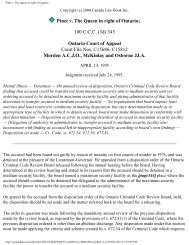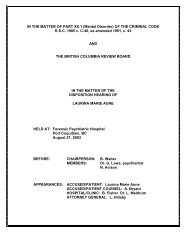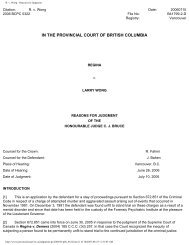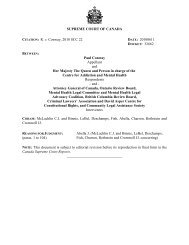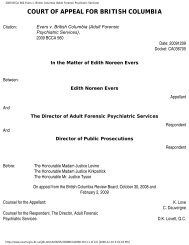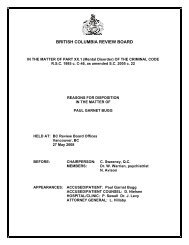R. v. Cuerrier - British Columbia Review Board
R. v. Cuerrier - British Columbia Review Board
R. v. Cuerrier - British Columbia Review Board
Create successful ePaper yourself
Turn your PDF publications into a flip-book with our unique Google optimized e-Paper software.
R. v. <strong>Cuerrier</strong><br />
88 Finally, he considered the Crown's argument that, because of the serious nature of the risk to<br />
which the complainants were exposed, public policy should intervene to vitiate their consent. This<br />
argument was based on R. v. Jobidon, [1991] 2 S.C.R. 714, which found that the vitiating factors listed<br />
in s. 265(3) were not exhaustive and that limited grounds exist upon which a court could base its<br />
conclusion that consent is vitiated on policy grounds. This same argument was advanced in Ssenyonga,<br />
supra, where it was found at p. 265 that the assault provisions of the Code were not designed to control<br />
the spread of AIDS, rather they were intended to "control the non-consensual direct or indirect<br />
application of force by one person to another".<br />
89 The trial judge concluded that although the accused's actions were repugnant and deserving of<br />
punishment, it would overstretch the offence of assault or aggravated assault to apply them to this<br />
case. He therefore allowed the application for a directed verdict and acquitted the accused.<br />
B. <strong>British</strong> <strong>Columbia</strong> Court of Appeal (1996), 141 D.L.R. (4th) 503<br />
90 Prowse J.A. began by reviewing the legislative and jurisprudential history of the fraud provision<br />
and noted that prior to the removal of the words "nature and quality of the act", the case law had<br />
narrowly defined the types of fraud which could vitiate consent. Further, she concluded that the Code<br />
amendments were not intended to broaden the categories of fraud which would vitiate consent, and that<br />
the trial judge was correct in following the decision in Petrozzi, supra.<br />
91 Prowse J.A. then considered whether a valid consent to sexual intercourse had to be an informed<br />
consent. She rejected the submission that the informed consent doctrine developed in Norberg v.<br />
Wynrib, [1992] 2 S.C.R. 226, should be applied in this case for two reasons. First, she did not find that<br />
the inequality of information which existed between the complainants and the respondent resulted in the<br />
power imbalance or exploitation contemplated in Norberg. Second, she was reluctant to import<br />
informed consent principles from tort law into the realm of criminal law.<br />
92 Prowse J.A. also rejected the Crown argument that the respondent's conduct exceeded the scope<br />
of the complainants' consent. She concluded that the sexual acts engaged in by the respondent and the<br />
complainants involved no more force than is naturally inherent in the sexual act.<br />
93 Finally, Prowse J.A. considered whether the complainants' consent should be rendered<br />
ineffective on grounds of public policy. She found it significant that the complainants in this case did<br />
not suffer physical injuries but were only exposed to the risk of injury. This was very different from the<br />
position presented in Jobidon, supra, where this Court vitiated a complainant's consent to engage in a fist<br />
fight where the force applied caused serious harm. Prowse J.A. concluded that the criminal law of<br />
assault is not the proper legal mechanism for dealing with the problem of HIV/AIDS transmission and<br />
she refused to create another category of conduct which would vitiate consent.<br />
III. Relevant Statutory Provisions<br />
http://ql.quicklaw.com/qltemp/C2KEwCMAFbZMTYcs/00011scr-00019415%2ehtm (30 of 44)2007-08-21 1:18:15 PM



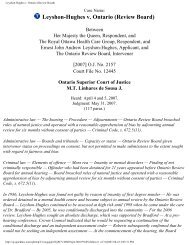
![LaFortune [LaFortunate] (Re) - British Columbia Review Board](https://img.yumpu.com/42779845/1/190x245/lafortune-lafortunate-re-british-columbia-review-board.jpg?quality=85)
